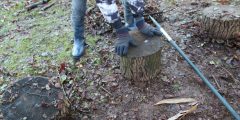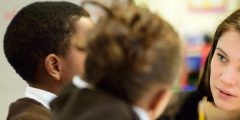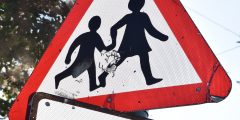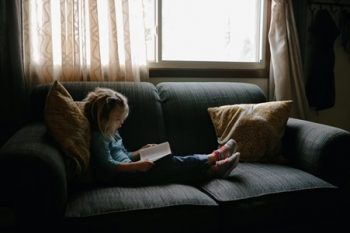The Power of an Immersive Curriculum
April 20, 2022
In this post, Thomas Dransfield, Class Teacher and Key Stage Leader at Bramcote Hills Primary School in Nottingham shares some examples of creating immersive environments across the curriculum. Our SPARK Curriculum In recent years, the curriculum has taken precedence amongst educational stakeholders, and rightly so, for it is the quality of a school’s curriculum which …
Under the Microscope: a closer look at Ofsted’s science research review
March 9, 2022
Over the last year, Ofsted has published research reviews into a range of different subjects, designed to collate the most current and most helpful research. In the first of our University of Nottingham Primary Education Network meetings for 2022, our colleague Jo Hancock led a session with a group of school leaders and tutors from …
Why don’t you build me up, buttercup? A Forest School recovery plan.
January 21, 2022
As schools continue to evaluate the impact of Covid-19 on their learners, former Deputy Headteacher, Rachel Peckover, explains how her three-form entry, suburban junior school in the East Midlands, set up Forest School provision. The school aimed to tackle issues around pupils’ social development as a result of lockdown, as well as the rise in …
Harnessing the power of story to promote mathematical learning
December 16, 2021
In this blog post, which was originally published on the 27th Nov, 2020 on ‘Ponderings on maths education’, Catherine Gripton and Helen J Williams explore how to harness the power of story to support mathematical learning. How might picture and story books enhance the mathematical experience we offer young children? All children are entitled to …
A change of perspective: the explanatory power of varied examples
November 17, 2021
In this post, Rupert Knight considers how drawing on varied examples when explaining new concepts can enhance understanding. It builds on previous blogs in this series, particularly those on a teacher’s core practices and on modelling. Showing the essence of an idea through multiple perspectives ‘Jim Jarvis hopped about on the edge of the road, …
Learning to be a subject advocate
October 13, 2021
In this blog post Anna Baker and Rachael Trott, supported by Catherine Gripton, reflect upon their experiences on the ‘Primary School Direct with Mathematics’ programme, summarising what supports beginning teachers to become advocates for a subject alongside developing their practice in the full range of primary subjects. Learning to teach Teaching is complex and learning …
Primary-Secondary transition
September 13, 2021
As schools return and a new cohort of Year 7s begin, John Perry reflects on the move from primary to secondary education and how primary teachers can support this process over the coming year. A minute ago it was June. Now the weather is September. The crops are high, about to be cut, bright, golden. …
What are the signature pedagogies of teacher education?
August 13, 2021
At a time when teacher education is under the spotlight, Rupert Knight revisits Lee Shulman’s idea of signature pedagogies as a way of developing shared, ambitious principles for the education of beginning teachers. Learning to teach in England In the last year, the process of learning to teach has come under renewed scrutiny in England. …
Spatial thinking: the missing piece in mathematics education?
July 1, 2021
In this blog post Catherine Gripton explores the potential of spatial thinking for supporting children’s success in mathematics, starting from the early years of primary school. Spatial thinking improves mathematics learning International rankings for education, such as TIMMS and PISA, compare countries by the performance of children and young people on mathematics tests. These are …
Children reading in lockdown
June 21, 2021
In 2020, the National Literacy’s Trust’s (NLT) research revealed how UK children’s reading practices (age 8-18) changed during the first lockdown (from March 2020). Prior to the lockdown, the Trust’s Annual Literacy Survey had sadly revealed a 15-year low in children’s enjoyment of reading. However, the 2020 survey showed that children read and enjoyed reading …










